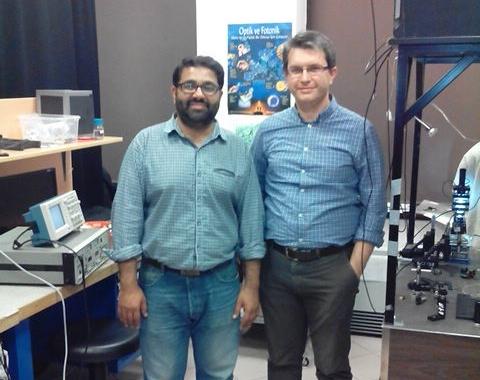
In Fall 2016, Pakistan Science Foundation (PSF) launched a joint call with the Scientific and Technological Research Council of Turkey (TÜBİTAK). The call received more than 100 joint proposals from researchers of Pakistan and Turkey. After a detailed review by relevant subject experts, 5 projects were selected for joint funding. The proposal of Dr. Imran Cheema, Assistant Professor, Department of Electrical Engineering, Lahore University of Management Sciences (LUMS) and Dr. Alper Kiraz, Professor, KOC University, Turkey, titled “Milk Contamination Sensor Based on Optical Fiber Cavity Ring Down Spectroscopy” was chosen among the funded projects. LUMS is the only institution in Lahore which received the funding.
“This is a great news and I am confident that this project is of great industry relevance,” congratulated Dr. Shahid Masud, Dean, Syed Babar Ali School of Science and Engineering (SBASSE).
“I am excited that my PSF grant is funded. This is a joint proposal with my Turkish collaborator. In this two-year project, we will develop milk contamination sensors by collaborating with KOC University. My other NRPU proposal is also directed towards optical fibre sensors. These two proposals will help me in developing a state-of-the art optical fibre lab at LUMS,” commented Dr. Cheema on his achievement.
According to the international agency for research on cancer of WHO, aflatoxin M1 (AFM1) is a carcinogenic compound that is routinely found in milk. Pakistan and Turkey who fall among the top 10 producers of milk in the world also face significant issues of AFM1 contamination. The researchers proposed to develop an easy to use fibre optical sensor that provides AFM1 detection in a solution without the aid of specialised laboratory personnel. The complementary scientific skills of the two research groups participating in the present proposal form a solid basis for successful completion of the proposed project objectives. In particular, whereas the Turkish PI has a long-standing track record in the field of optical cavities, fibre systems, and microfluidics, the expertise of the Pakistani PI lies in electromagnetic modelling of optical systems, cavity ring down spectroscopy, and development of optical setups leading towards commercialisation. Both PIs have an established track record of demonstrating novel optical sensors for various applications.








